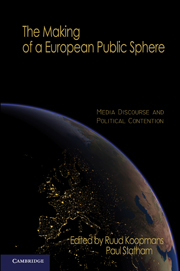Introduction
Europe's Search for a Public
Published online by Cambridge University Press: 05 June 2012
Summary
Today the European Union is visible most days to most Europeans, should they care to glance at their driving licenses, passports, or the coins in their pockets. There are plenty of reminders for ordinary people that they live in an age of political globalization, and that as inhabitants of the European region they are part of its largest experiment so far: the European Union (EU). At the end of the first decade of the new millennium, the EU is a regional order of twenty-seven countries. It is the world's most advanced institutional cooperation and a close interpenetration of societies, markets, and governments, both across borders and between supranational and national actors. Its multileveled political architecture is historically unprecedented and over time its power has grown beyond recognition. However, this substantial advancement of European integration over the past 50 years has been driven by political elites and, at least for the period of so-called “permissive consensus,” has largely been out of the public eye. Over the past decade the political channels from the executive to the governed have been increasingly seen as inadequate, resulting in prominent debates about the EU's perceived democratic and legitimacy “deficits” in policy, academic, and public circles. The watershed moment came in the rejection of Europe's constitutional efforts by the French and Dutch peoples in the 2005 referenda. Taken against the expressed wishes of all main political parties, and all mainstream mass media, these popular rejections in usually supportive countries underlined the passing of the age of “permissive consensus.”
- Type
- Chapter
- Information
- The Making of a European Public SphereMedia Discourse and Political Contention, pp. 1 - 10Publisher: Cambridge University PressPrint publication year: 2010
- 2
- Cited by



